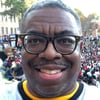It was far from “Make America Great Again,” but former President Jimmy Carter called on the United States to become a “true superpower.”
“Not based on military. Not based on economic or political influence,” Carter said. “But that we be champions of human rights. Or peace. Or the environment. Or equality. Welcoming foreigners to our shores.”
Just an afternoon removed from attending the state funeral of former President George H.W. Bush at the Washington National Cathedral, Carter rushed back to Atlanta on Wednesday night to host a conversation marking the 70th anniversary of the Universal Declaration of Human Rights.
Mere hours earlier, during one of the rare occasions on which all living U.S. presidents were gathered, Carter and his wife, Rosalynn, sat in the front row of the cathedral — along with former Presidents Bill Clinton and Barack Obama and current President Donald Trump — for the funeral of the 41st president, who was eulogized by his son, George W. Bush, the 43rd president.
Carter did not talk about Bush Sr. or the funeral during the panel. He wasn’t asked, although there was a Q&A session.
Instead, Carter talked about faith and how religious rights and human rights can be aligned, the role of spiritual leaders in promoting human rights, and how everyday people of faith can defend human rights.
On the panel with Carter were Rabbi Jill Jacobs of T’ruah: the Rabbinic Call for Human Rights, and Imam Omar Suleiman of the Yaqeen Institute for Islamic Research.
It is unclear whether Carter spoke with Trump at the state funeral, as the current president shared what many considered a series of awkward exchanges with his predecessors. But it was clear that the 39th president was offering a rejection of what some see as a sharp turn by the United States toward isolationism.
He said of the United States, “Within our genes (are) self-correcting capabilities.”
Carter said he wanted a return to when America was looked at as a beacon of hope and encouragement.
“I would love for everybody on earth ... when they have a conflict to say, ‘Let’s go to Washington and see how they observed the peace,’” Carter said. “‘Let’s go to Washington to see how they maintain human rights.’”
About the Author






